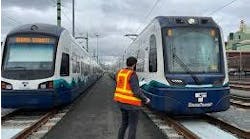Ride On-Demand: RTC of Southern Nevada & Lyft Partner on Paratransit Pilot Program
Transportation options are growing, especially with the microtransit opportunities provided by transportation network companies (TNCs) like Lyft, which can provide same-day, on-demand and/or advance scheduled rides as an alternative to available conventional public transportation. As a public transit agency, the Regional Transportation Commission of Southern Nevada (RTC) wants to stay ahead of the curve and integrate modern transportation solutions to keep our 64 million annual passenger trips moving efficiently.
We wanted to find better ways to effectively transport customers and enhance their experience while saving money to reinvest back into our system.
In an effort to provide more accessible, flexible and cost-efficient residential transit services, the RTC recently launched a pilot program called Ride On-Demand with Lyft, the fastest-growing rideshare company in the United States, for a small select group of Paratransit riders. The Lyft pilot program will allow up to 200 Paratransit customers the ability to enjoy more flexible service and to be more spontaneous by scheduling rides on demand, something they previously could not do.
For the first time in Southern Nevada, Ride On-Demand will provide the traditional Paratransit customer with a same-day transportation option. Both ADA (Americans with Disabilities Act) and non-ADA service are provided. Lyft educates its drivers on how to assist passengers with collapsible wheelchairs as well as low-vision and hard-of-hearing/deaf clients to ensure the highest quality of service.
Rides can be scheduled directly through the Lyft app. Customers without access to a smartphone or require a wheelchair accessible vehicle can call RTC Customer Care seven days a week from 7 a.m. to 6 p.m. to request a ride via the program. SafeRide Health’s SafeRiderManager System provides a digital platform for the RTC to schedule rides directly onto the Lyft platform.
Ride On-Demand puts customers in control – they don’t have to schedule rides in advance, unless they would like to. They can get a ride on-demand and be picked up within minutes.
Not only does this pilot program enhance the customer experience, but it also allows us to save money that we can reinvest back into our transit system.
While Paratransit passengers only pay $3 per trip, it costs the RTC an average of $32 for a one-way trip. The pilot program provides increased flexibility for customers, but it does not increase passenger costs. In most cases, the customer continues to pay $3 one way.
The RTC subsidizes the ride up to $15 each way, and if the ride costs more than $18 total, the client has the option to pay the remaining balance or cancel the ride and use their Paratransit existing service. In setting the subsidy cost, we determined the average Paratransit ride is 10 miles one way, which is about $18 via Lyft.
“We’re excited to be partnering with RTC on this innovative new program, which for the first time will provide seniors and individuals with disabilities the freedom to book rides in real time, expanding their access to employment, education, healthcare and social activities,” said Yacob Girma, Lyft’s Las Vegas general manager. “Partnering with agencies such as RTC to support critical rider programs is a crucial step towards improving access to transportation in the communities we serve.”
And customers are pleased with the service Lyft provides. Raquel O’Neill has been a Paratransit client since 2000 when she was a freshman in college.
“I’ve taken close to 10 rides so far, and it’s amazing because of what it gives me – freedom,” said O’Neill. “I get to go where I need to go when I’m ready. I get to take my time with my son in the mornings because mornings are less hurried. I can make him breakfast and not worry that the Paratransit bus is waiting for me. I want to be respectful of the driver’s and riders’ time, but sometimes a five-year-old doesn’t understand that adults have busy lives. With a Paratransit bus transporting several passengers, I would have to schedule a pick-up an hour to 1.5 hours before the time I need to get to work. Now it only takes me 15 minutes, and all of my Lyft rides have arrived in five minutes or less when I’ve hailed them.”
“I’ve taken Lyft before opting into the pilot program, and I’ve noticed little changes in the app that’s been designed for the visually impaired,” she added. “There’s a fear factor with phones and apps among the blind because they’re afraid of making mistakes. But the Lyft app is simple to use, and the process is seamless. I feel completely independent and free.”
Continued positive customer feedback is critical as we evaluate the pilot program’s efficiency. Eventually, we’d like to open Ride On-Demand to more Paratransit clients like veterans, dialysis patients and the visually impaired. Success may also lead us to use TNCs such as Lyft to complement other transit services, including first-mile/last-mile connectivity with the transit system.
Mobility enables people to enjoy greater independence and freedom, just like Raquel. As a regional transit agency that provides both transit and Paratransit services, the RTC is always looking for innovative ways to improve service and move customers around the Las Vegas valley more efficiently and effectively.
As transportation options continue to evolve, public transit and Paratransit services in Southern Nevada will evolve too – but all the while, the RTC will still strive to provide customers with various mobility options and the highest quality of customer service possible.
Tina Quigley is the general manager of the Regional Transportation Commission of Southern Nevada. For more information, contact RTC at 702.676.1500 and follow @RTCSNV on Twitter.



